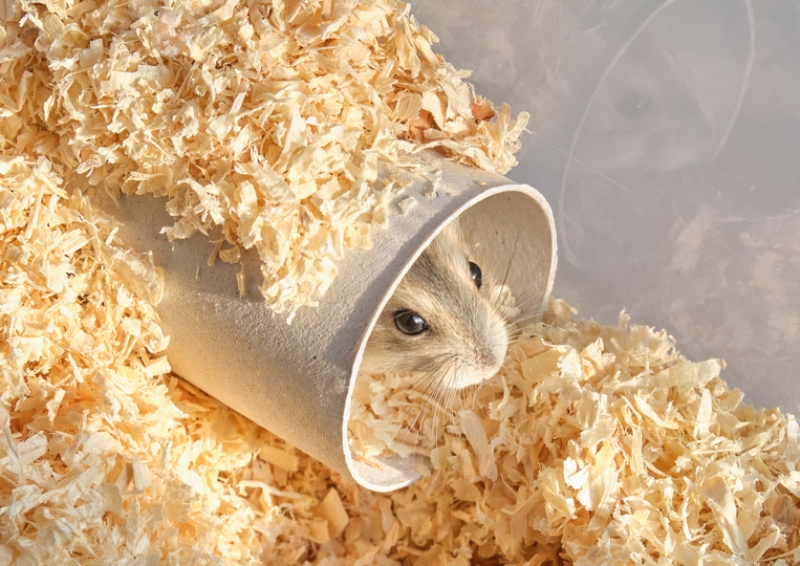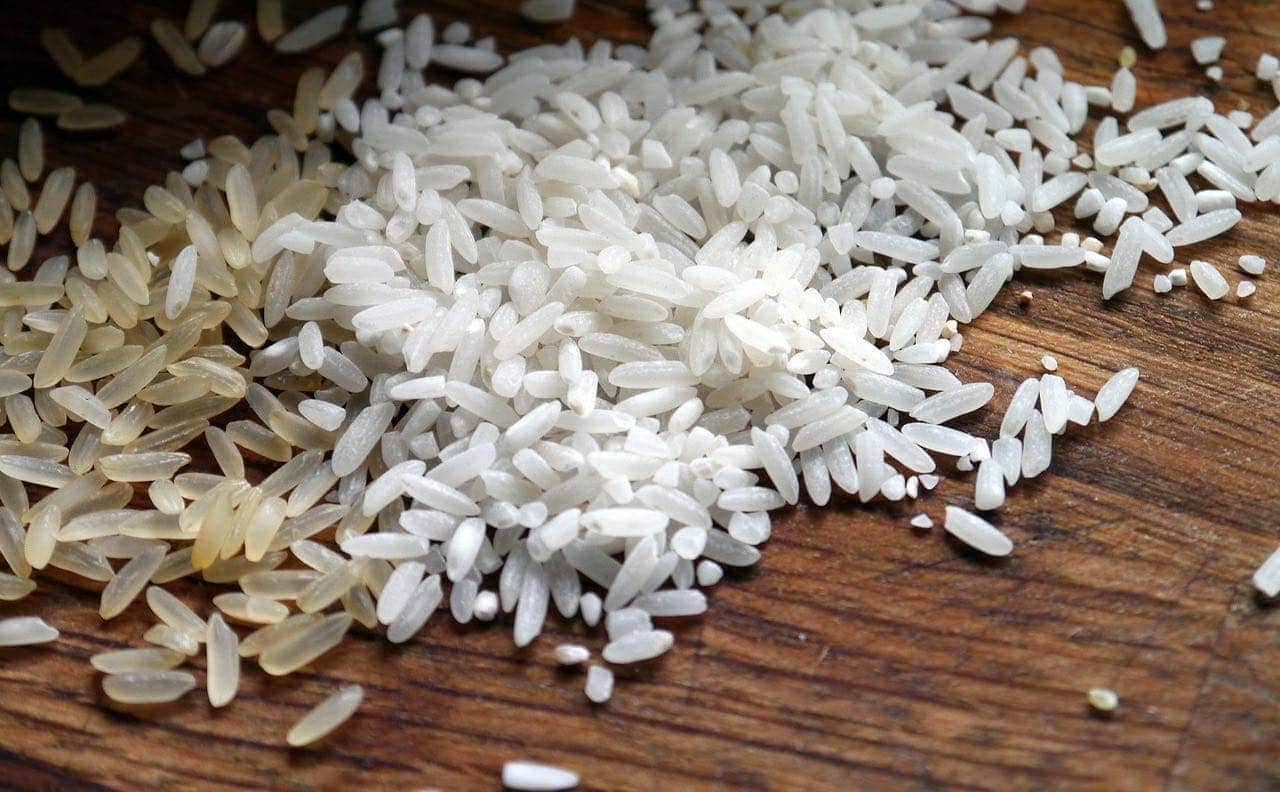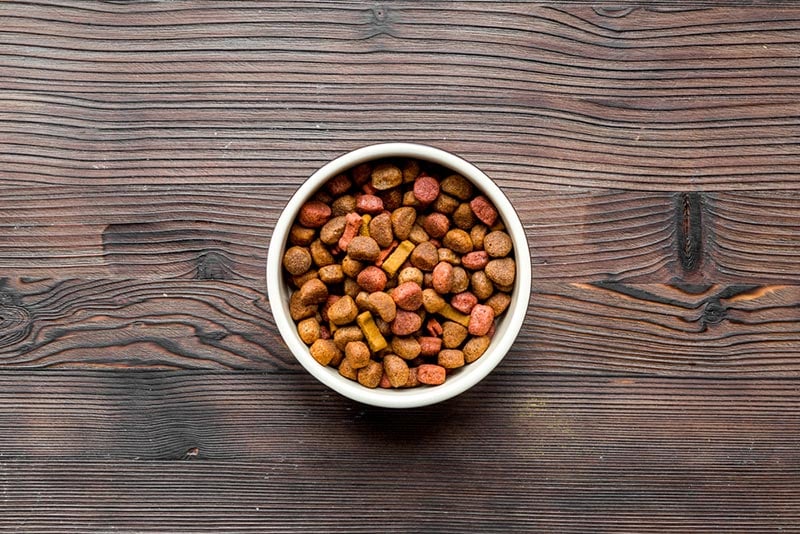Can Hamsters Eat Potatoes? Vet Approved Facts & FAQ
Updated on

Click to Skip Ahead
Hamsters are adorable little pocket pets, and part of giving the very best of care is making sure they get to enjoy a diet that is healthy, nutritious and varied. Because hamsters are omnivorous, they are able to eat a wide variety of foods, which means we can have a lot of fun finding healthy foods for them to sink their teeth into. So you might be wondering if potatoes are something they can safely eat. The answer is yes, hamsters can eat potatoes, but it must be cooked.
What Do Hamsters Eat in the Wild?
Hamsters are small, active rodents that will opportunistically eat plants, seeds, nuts, and even small animals.
- Grains
- Seeds
- Nuts
- Cracked corn
- Plant leaves, stems, berries and flowers
- Insects
- Small reptiles and amphibians
- Eggs
The ideal diet for a pet hamster should mimic the types of foods they would eat in the wild, and should consist of the following:
- 35–40% carbohydrates
- 15–25% protein
- 4–5% fat and
- 5% crude fiber
One significant difference between a wild and pet hamster is exercise. In the wild, it is not unusual for a hamster to run up to 5.5 miles in one night. Because they burn so many calories, wild hamsters need to consume a diet that is equally high in calories.
Although pet hamsters may get a lot of exercise in their habitats and running wheels, they will never match the calorie-burning levels of those in the wild. For this reason, we need to be careful when it comes to choosing foods for these tiny pets, to ensure they get everything they need, without overdoing it, as they can very easily become obese.
What Are the Benefits of Potatoes for Hamsters?
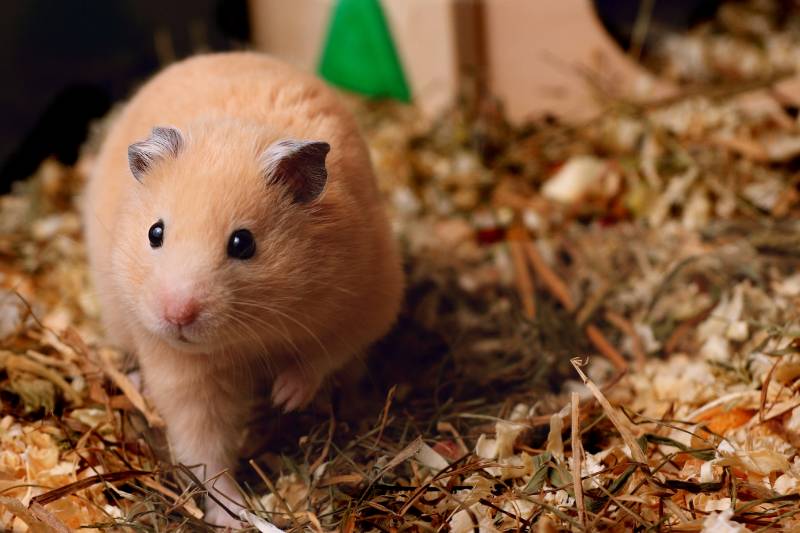
Potatoes are full of starch, a type of carbohydrate, which are the body’s main fuel source. They also contain quite a lot of something called ‘resistant starch’. This type of starch goes through much of the digestion process unaltered, acting more like fiber in the large intestine, feeding the microbiome. Studies also showed that a diet high in this type of starch resulted in significantly lower serum cholesterol and triglyceride levels, compared to diets containing normal starch. Research has also indicated that this type of starch can increase insulin sensitivity in humans, reducing the incidence of type 2 diabetes and obesity, effects which will likely be similar for hamsters, which are often used as models for humans in research.
So what does this mean for hamsters? Theoretically, potatoes can be a good source of energy for your rodent friend, with a lower risk of obesity and diabetes, both conditions which hamsters are known to suffer from when kept as pets.
So how much potato can your hamster eat? Let’s take a look:
Potato Nutrition Facts
Most people have russet potatoes in their pantry, so here’s a nutritional breakdown of one large russet potato, compared with the daily nutritional needs of a hamster. Remember that potatoes vary in size, and so too will their nutritional value.
Russet Potato
About 6.1 ounces (173 grams)
| Calories: | 291 kcal (1.7 kcal/g) |
| Protein: | 7.9 g |
| Fat: | 0.3 g |
| Carbohydrates: | 66.68 g |
| Fiber: | 4.8 g |
Next, we’ll consider the ideal hamster diet.
- 70-80% Commercial pellets (avoid muesli types)
- 10-20% Leafy greens and fresh vegetables
- 5-10% Treats – fruit, animal protein (eg. mealworms)
- Hay (eg. Timothy hay) provided for burrowing and munching
- Ready access to clean fresh water
We know that the calorie requirement for most hamsters is around 25 kcal per day 1. Based on this, around 5 kcal can be made up of vegetables. So the downside of potatoes is that, in order to keep within your hamster’s requirements, they should have no more than 3 g of potato per day, which is around a ½ inch cube. Not very big, but then again, neither are hamsters!
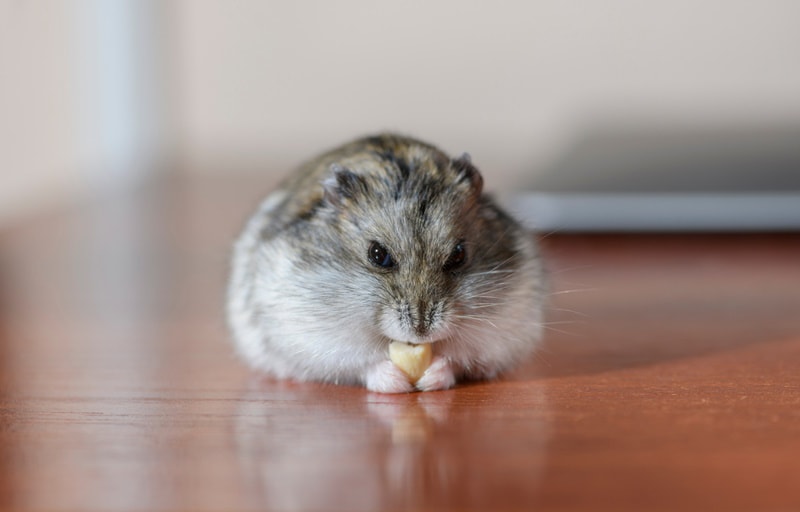
How Do I Offer Potatoes to My Hamster?
There are a few considerations when offering your hamster some potatoes:
- It must be cooked from fresh – don’t used canned or powdered
- It must be free of any butter, oil or seasonings
- You can leave the skin on – extra fiber!
What About Sweet Potatoes?
You might be surprised to learn that sweet potatoes belong to a completely different plant family to regular potatoes, but they are also safe for your hamster. In fact, with around half the calories of regular white potatoes, you can offer them twice as much!
What Else Can Hamsters Eat?
As we discussed earlier, the majority of your hamster’s daily diet should be in the form of a hamster specific commercial pellet diet. Muesli type hamster foods are much higher in sugar and calories, and hamsters will often pick out the tastiest bits first.
If you want to know what other foods can be included in their diet, we’ve made a list below, but this is just the tip of the iceberg.
- Leafy green vegetables (dandelion, collard greens, kale)
- Carrots
- Capsicum
- Broccoli
- Carrot
- Green beans
- Apples
- Strawberries
- Blueberries
- Raspberries
- Papaya
- Melon
- Mealworms
- Crickets
- Cooked chicken
- Boiled eggs
What Foods Do I Need to Avoid?
Some of these foods are potentially toxic, others will just cause stomach upset, but all should stay off your hamster’s menu:
- Rhubarb (leaves included)
- Any sugary or salty foods
- Apple seeds and core
- Citrus fruit
- Garlic & Onions
- Chocolate
- Red meat
- Dairy
Conclusion
Feeding an animal that’s an omnivore can be a little tricky since they eat so many foods. How can you know which ones are healthy? Well, now you know at least one more food your hamster can enjoy.
See Also:
Featured Image Credit: Christos Giakkas, Pixabay


